Encephalopathy is a disease, in which organic brain damage is observed. The condition can proceed in different forms, is provoked by various factors, but often occurs a lesion of mixed genesis, which is quite difficult to diagnose and identify a predisposing factor.
This condition requires a comprehensive examination, which allows you to prescribe the most adequate treatment.
Record content:
- 1 Views
- 2 Stages and degrees
- 3 Symptoms
- 4 Reasons for the appearance
- 5 Diagnostics
- 6 When to see a doctor
- 7 Prophylaxis
-
8 Treatment methods
- 8.1 Medications
- 8.2 Folk methods
- 8.3 Other methods
- 9 Possible complications
- 10 Video about encephalopathy
Views
The pathological condition can be acute and chronic. The first occurs quite often, is accompanied by pronounced manifestations and provokes complications from the internal organs. The chronic form is considered less dangerous, but is also accompanied by pronounced manifestations, can provoke complications, but this happens less often than with the development of acute encephalopathy.
Experts also distinguish congenital and acquired forms of the disease. The first is usually difficult, manifests itself in children at birth as a result of a lack of oxygen during gestation and other factors. The acquired form can occur under the influence of many factors, proceeds with varying degrees of severity and often leads to severe complications.
There is a classification that separates pathology depending on the provoking factor that led to its development: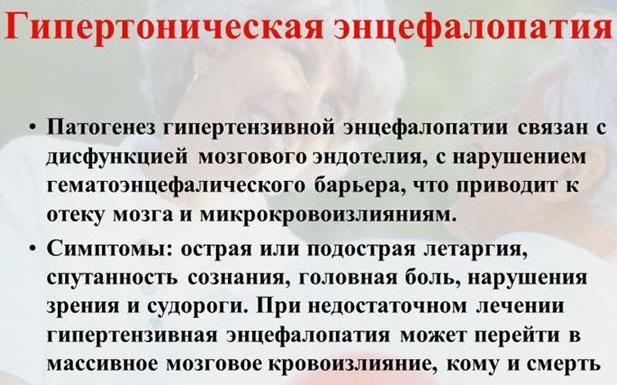
| Type of disease | Peculiarities |
| Dyscirculatory form | It develops against the background of circulatory pathologies and other somatic disorders in the body. This type of disease is very common, mild or severe, or with severe symptoms. |
| Hypertensive | Such a pathology is considered the result of the progression of arterial hypertension in patients of different ages. It usually manifests itself when taking medications that cannot correct blood pressure, which increases the risk of negative effects on the brain. |
| Toxic | This form of pathology occurs when the body is exposed to toxic compounds, poisons, alcohol and other substances. It should be noted that brain cells react sharply to any compounds that have a toxic effect. |
| Leukoencephalopathy | This type is not so common, but arises as a result of an increase or decrease in the level of leukocytes and the development of other disorders against this background. |
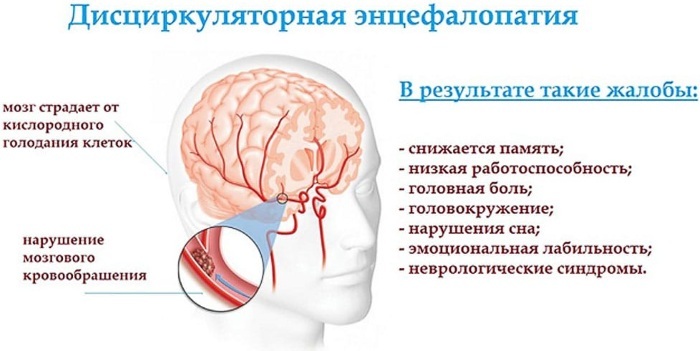
Depending on the presence or absence of severe complications, a complicated and uncomplicated form of a pathological condition occurs. The latter is considered less dangerous and does not provoke serious consequences, which persist after the disappearance of the manifestations of the underlying disease.
Stages and degrees
Encephalopathy of mixed genesis is a condition that always proceeds in 3 stages, which does not depend on the type of disease.
- Stage 1 is also called compensated. It is considered the onset of the disease and is mild. There are no cognitive and other impairments at this stage, the patient may only be bothered by minor symptoms, but he does not go to the doctor, because he considers them a sign of fatigue. It is also worth noting that when visiting a doctor at a compensated stage, it is possible to completely eliminate the manifestations of encephalopathy in a conservative way.
-
Stage 2 is called subcompensated. At this stage, the patient's condition worsens, more pronounced manifestations appear, which affect not only the state of health, but also the performance, the functioning of internal organs. In addition, patients note that the subcompensated stage is accompanied by mental disorders, that is, there is a deterioration in memory and attention.
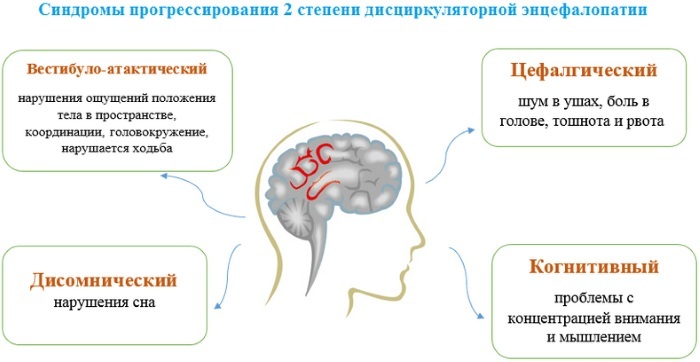
Treatment at stage 2 is considered mandatory, and it should be started in a timely manner, since delay leads to the development of complications.
- Stage 3 is also called decompensated. It almost always provokes severe complications, and changes in the central nervous system become irreversible. As a result, there is the development of severe neurological disorders, a significant aggravation of all symptoms. In this case, irreversible changes become the main manifestations, and they can be stopped only for a short period.
The treatment regimen is different for the patient at different stages. That is why, with early diagnosis of the disorder, the patient has much more chances to be completely cured and avoid the consequences.
Symptoms
The symptomatology of a pathological condition largely depends on the stage of its development. The initial or compensated stage is accompanied by mild headaches and dizziness, which usually occurs with fatigue, increased stress and as a result of emotional stress.
At the same time, the patient does not consider the signs as a reason for going to the doctor, he can independently take any medications that eliminate pronounced manifestations.
Only in some cases, at the compensated stage, patients visit a doctor, and a comprehensive examination makes it possible to clarify the cause of the disorder. The subcompensated stage is accompanied by severe clinical manifestations. Headaches become a constant companion of a person, can be accompanied by fluctuations in blood pressure indicators, as well as dizziness.
As the condition progresses, the onset of headache may be accompanied by tinnitus, blurred vision, and other disorders. A feature of the subcompensated stage is that it is at this stage that cognitive disorders appear, manifested in the form of impairment of memory and attention.
The patient cannot concentrate on performing any work, he constantly makes mistakes, and his performance is significantly reduced. Many patients report a deterioration in nighttime sleep and the simultaneous occurrence of constant sleepiness during the day. It also negatively affects physical and mental performance.
The absence of a normal night's sleep leads to the development of complications from the blood vessels and the heart, fluctuations in blood pressure are noted. Additionally, there is a change in mood in one direction or another several times during the day. Such violations will certainly lead to the development of a depressive state.
The decompensated stage is accompanied by the inability of the patient to maintain balance in an upright position, as well as severe headaches that cannot be relieved by conventional analgesics. One of the dangerous symptoms is the inability of the patient to control his own movements.
At this stage, memory impairments are so pronounced that a person cannot do without outside help. He constantly needs care and supervision.
It is not recommended for such patients to remain alone, and especially to go out on the street unaccompanied, as they may get lost. Usually, at 3 stages, manifestations of somatic pathologies, which are of a chronic nature, also join.
Each patient may have different symptoms, as well as the severity of their manifestation. However, common signs are present in any form and type of disorder.
Reasons for the appearance
Encephalopathy of mixed genesis is a disorder that is caused by many reasons, which do not always depend on the type of pathology. The toxic form occurs when the brain is regularly exposed to low doses of toxic substances or alcohol. In addition, a single exposure to high doses can provoke complications.
Hypertensive occurs against the background of uncontrolled arterial hypertension. Leukoencephalopathy is considered the result of pathologies of the blood system. The dyscirculatory form develops against the background of somatic disorders. Congenital encephalopathy is considered a consequence of intrauterine pathologies, acquired occurs against the background of other diseases.
There are many factors that can provoke a pathological condition:
- Severe diabetes mellitus, which leads to damage to the central and peripheral vessels.
- Severe arterial hypertension in patients of different ages.
- Ischemic stroke of varying severity. The likelihood of developing complications in the form of encephalopathy increases with repeated attacks of circulatory disorders.
- Atherosclerosis with damage to the vessels of the brain, spinal cord. In this case, the initial stage of pathology can lead to the development of unexpressed manifestations of the disease.
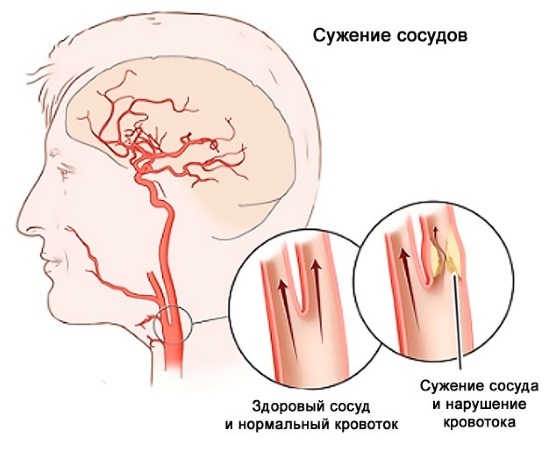
- Constant exposure of brain cells to toxic substances due to professional activity.
- Chronic alcoholism and drug addiction.
- Closed craniocerebral injuries, in which blood circulation is impaired, and the condition of the brain worsens.
- Radiation exposure to the body for a long period of time, the passage of a course of radiation therapy.
- Angiopathies, endarteritis of various forms and severity.
- Severe epilepsy, accompanied by frequent relapses of the disease.
- Mental disorders in which organic damage to the brain occurs.
- Birth trauma provoking various complications from the central nervous system.
The cause may be not one, but several factors, which only aggravates the symptoms and worsens the course of the underlying disease that provokes encephalopathy.
Diagnostics
To diagnose the disease, several methods are used that allow not only assessing the degree of neglect of the condition, but also the presumptive cause of the disorder.
The most commonly used methods are:
- General examination and questioning the patient allows you to assess his condition and the presence of associated complications. It is carried out in each clinic for free. During the examination, the doctor specifies the time when the first symptoms appeared, as well as the conditions for their occurrence. After that, the appropriateness of other diagnostic methods is determined.
- General blood analysis It is also considered a standard examination method, it is carried out in each clinic and costs about 300 rubles. Based on the results obtained, the doctor prescribes additional treatment. The analysis helps to see the accompanying abnormalities of inflammatory origin. Quite often, this study involves the identification of blood glucose levels. This is usually required by patients who suffer from diabetes mellitus or have a tendency to similar disorders.
- Encephalogram It is considered a very effective diagnostic method because it helps to assess the activity of the brain. At the same time, using a special device, the activity of the brain is studied, the doctor examines the images obtained and draws appropriate conclusions. The cost of the research is approximately 500-600 rubles. Diagnostics is carried out in public and private clinics.
-
Angiography of cerebral vessels is considered a very effective diagnostic method and is carried out in public clinics. The cost of the examination is approximately 700 rubles. During the study, the vessels of the brain are studied, as well as their patency, areas in which there are pathological changes are determined.
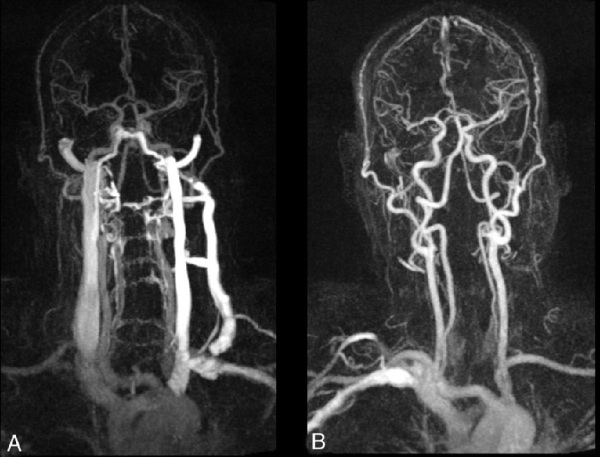
MRI of the neck vessels with contrast. What shows -
MRI is considered the most effective diagnostic method, carried out in clinics that have the appropriate equipment. The cost of the examination is approximately 2000-2500 rubles. The study examines the brain, as well as other organs that, according to the doctor, may cause the disorder.
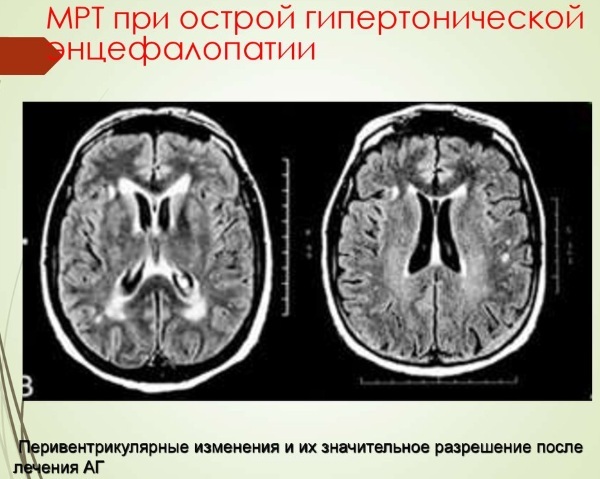
The result of a comprehensive examination becomes the basis for the appointment of treatment. The most effective method is considered to be magnetic resonance imaging.
When to see a doctor
Encephalopathy is considered a rather dangerous disease, especially when a pathology of mixed genesis is detected, therefore it is important to consult a doctor in a timely manner when the first symptoms appear. This condition is treated by a neurologist.
However, after contacting a specialist, you may need to consult an endocrinologist, therapist, cardiologist, psychiatrist.
Prophylaxis
It is quite difficult to prevent pathology, especially in the presence of concomitant diseases of internal organs or the development of its congenital form. However, experts recommend minimizing the amount of alcohol consumed, quitting smoking and taking drugs.
In addition, it is recommended to pay more attention to proper nutrition, to exclude from it foods that, if consumed excessively, can provoke an increase in blood sugar levels. These include confectionery, white bread, and processed cereals. Dieting can help avoid complications.
Additionally, it is worth giving up carbonated sweet drinks, strong tea and coffee. When receiving craniocerebral injuries, the patient should carefully monitor his condition.
The appearance of the first signs of encephalopathy should be the reason for seeking medical attention. The most effective method of preventing complications of the disease is considered timely treatment at the initial stage.
Treatment methods
For the treatment of patients, conservative methods, recipes of traditional medicine and some other methods are used. In each case, the scheme and duration of treatment may differ.
Medications
Mixed encephalopathy is a condition that is successfully treated with drugs at an early stage.
Most often, the following funds are prescribed from different groups:
-
Ceraxon - a neuroprotective agent that improves the transmission of nerve impulses and prevents the progression of neurological disorders. When using the solution, it significantly improves the functioning of the brain. The solution is administered at 4 ml per day intramuscularly for 10-20 days, it is considered very effective. Price - from 80 rubles. for 1 ampoule.
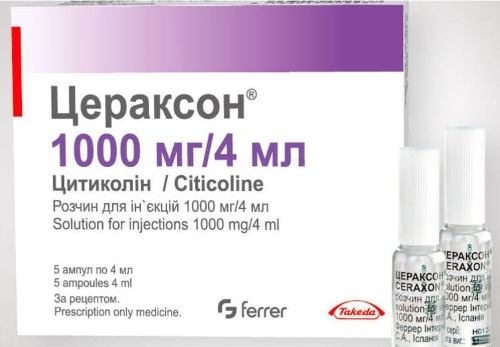
- Neuroubin - B vitamins, which also have a beneficial effect on nerve tissues and improve the passage of impulses, are highly effective when administered intramuscularly. For 10-15 days, the patient receives 3 ml of the drug intramuscularly. Price - from 30 rubles. for the ampoule.
- Cerebrolysin - means for improving blood circulation and nutrition of brain tissues, helps to improve cell function and prevents complications. It is prescribed in courses of 10-20 days with daily administration of 5 to 10 ml of the agent intravenously in a stream. The drug is very effective and relatively safe due to its natural composition. Price - from 400 rubles. per packing.
- Actovegin - a drug for improving tissue nutrition, characterized by high efficiency. It is infused intravenously at 10 ml per day for 20 days, helps to improve the patient's condition and the functioning of the brain. After the course, the memory and concentration of the patient's attention improves. Price - from 50 rubles. for the ampoule.
- Cavinton - an effective vasodilator medication that improves the condition of the vessels of the brain. Helps to reduce blood pressure indicators, relieves headaches. It is administered intravenously using a dropper after preliminary dilution of 2 ml of the drug in 200 ml of sodium chloride 0.9%. The course of treatment consists of 10 daily procedures. Price - from 250 rubles.
-
Enalapril - an antihypertensive medication that is highly effective and improves the condition of patients with hypertension. The initial dosage is 5 mg, the drug is available in tablets. Gradually, the dose can be increased to 20 mg per day, and pills are taken on an ongoing basis. Price - from 60 rubles.
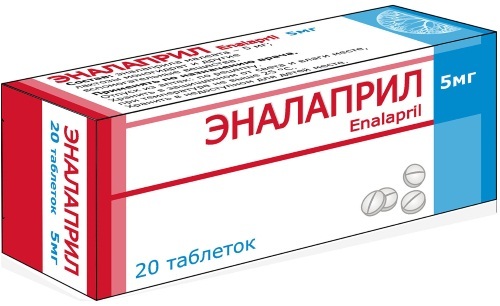
Enalapril is a medicine for vasodilation that hypertensive patients take every day - Atorvastatin - effective pills that are used to lower blood cholesterol levels. They help to improve the course of atherosclerosis and prevent the development of encephalopathy against its background. The daily dosage is 10-80 mg, depending on the degree of neglect, the drug is taken for 3-6 weeks. Price - from 200 rubles.
The dosage and duration of use of funds in each case is determined individually.
Folk methods
Treatment of encephalopathy with folk remedies does not work, but to reduce arterial pressure and obtaining a mild sedative effect, which will reduce the dose of drugs, they can be used.
Valerian rhizome tincture is considered a good natural sedative with high potency. To obtain the product, 20 g of pre-crushed rhizomes should be insisted in 100 mg of alcohol for 2 weeks. Take the finished filtered product in the morning and evening, 20 drops, the course lasts 2 weeks.
Motherwort broth also has a mild sedative effect, helps to slightly reduce blood pressure, is considered effective. For 500 ml of water, you need to take 15 g of dry raw materials, leave for 2 hours, filter. Take the finished product 20 ml 2 times a day for 10 days.
Alternative medicine recipes cannot become a full-fledged substitute for drugs; they are used only with the permission of a doctor and in the absence of contraindications.
Other methods
Mixed encephalopathy is a disease that can be treated with physiotherapy during the recovery period. They help to improve the condition of the muscles and also have a positive effect on the state of the nervous system.
Massage is considered the most common method. Moreover, it should be done only by a specialist in a medical institution and in the absence of contraindications. The session lasts 20-45 minutes, is carried out 1 time in 2-3 days. During the procedure, blood circulation improves, muscles relax, and the patient's mood improves. This allows you to eliminate the residual symptoms of the disease.
Acupuncture is an unconventional but very effective method that involves the introduction of special needles into biologically active points on the patient's skin in order to stimulate them and improve the functioning of the nervous systems. During the procedure, the patient lies motionless for 30-40 minutes while there are needles in his body. Sessions are carried out 2 times a week, the course consists of 10-15 procedures.
Possible complications
Lack of treatment can provoke complications.
The most common ones are:
- The transition of pathology to a chronic form.
- Irreversible changes in the brain, provoking a violation of thought processes.
- Loss of the patient's ability to move independently or perform simple household manipulations.
- Violation of the sensitivity of the organs of the reproductive system.
- Development of a mental disorder.
The most dangerous complication is considered a lethal outcome, which develops with a severe course of pathology and the development of other diseases. In addition, it is worth remembering that a patient with a severe form of encephalopathy becomes almost helpless and also dangerous to himself.
Encephalopathy is considered a rather serious disease, especially when a condition of mixed origin is detected, which is associated with rapid progression in the absence of treatment. This condition must be diagnosed and treated promptly in order to prevent complications.
Video about encephalopathy
3 stages of discirculatory encephalopathy:



